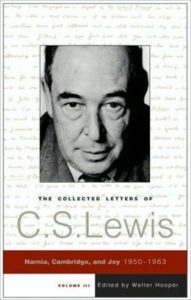I’ve been sharing some of the paper I’m going to present at the upcoming C. S. Lewis Foundation summer conference. The theme of the conference is on how Christians can participate in the public square. The last section of my paper draws on Lewis’s insights on that matter.
In my previous excerpt, Lewis was writing about some of the pitfalls of democracy. He continues in that vein:
 Lewis had an exchange on this issue with one of his regular American correspondents, Mary Van Deusen, who had raised the concern about communists infiltrating the government. Lewis responded that that raised the whole issue of one of the problems of a democracy.
Lewis had an exchange on this issue with one of his regular American correspondents, Mary Van Deusen, who had raised the concern about communists infiltrating the government. Lewis responded that that raised the whole issue of one of the problems of a democracy.
A democratic form of government, he explained, rested on the will of the majority. What if, he queried, a majority should someday introduce communism, or even devil worship or human sacrifice? How should we respond in such situations? “When we said ‘Govt. by the people’ did we only mean ‘as long as we don’t disagree with the people too much'”?
He concluded, “Of course there is no question of its being our duty (the minority’s duty) to obey an anti-God govt. if the majority sets it up. We shall have to disobey and be martyred. Perhaps pure democracy is really a false ideal.”
To forestall that terrible scenario from becoming reality, Lewis encouraged Christian involvement in the public square. When Van Deusen wrote to him about some very good people getting positions in the American government, he was pleased. One of his greatest fears about America, he shared with her, was “that politics were not in the hands of your best types and that this, in the long run, might prove ruinous. A change in that, the beginning of what might be called a volunteer aristocracy, might have incalculable effects.”
In fact, Lewis, in another of his essays, comes out strongly in favor of specific political activity with regard to appealing to legislators. While rejecting the idea of setting up a Christian political party, he nonetheless proposed what he called an “interdenominational Christian Voters’ Society” that should operate as a kind of pressure group.
If a political party sought the support of this society, it would have to pledge first its support for the society’s goals for the nation. “‘So all it comes down to is pestering M.P.’s with letters’? Yes; just that. I think such pestering combines the dove and the serpent. I think it means a world where parties have to take care not to alienate Christians, instead of a world where Christians have to be ‘loyal’ to infidel parties.”
Lewis’s insight here has something to offer American Christians as we look toward our next presidential election. What matters most, loyalty to a party or to our Christian convictions?
I’ll share the final excerpt next Saturday.
